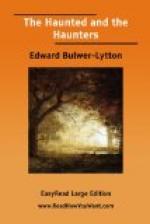“Plase your Reverence,” said Bartley, “she came in to Mary, and she alone in the house, and for the matther o’ that, I believe she laid hands upon her, and tossed and tumbled the crathur, and she but a sickly woman, through the four corners of the house. Not that Mary lets an so much, for she’s afeard; but I know from her way, when she spakes about her, that it’s thruth, your Reverence.”
“But didn’t the Lianhan Shee,” said one of them, “put a sharp-pointed knife to her breast, wid a divilish intintion of makin’ her give the best of atin’ an’ dhrinkin’ the house afforded?”
“She got the victuals, to a sartinty,” replied Bartley, “and ‘overlooked’ my woman for her pains; for she’s not the picture of herself since.”
Everyone now told some magnified and terrible circumstance, illustrating the formidable power of the Lianhan Shee.
When they had finished, the sarcastic lip of the priest curled into an expression of irony and contempt; his brow, which was naturally black and heavy, darkened; and a keen, but rather a ferocious-looking, eye shot forth a glance, which, while it intimated disdain for those to whom it was directed, spoke also of a dark and troubled spirit in himself. The man seemed to brook with scorn the degrading situation of a religious quack, to which some uncontrollable destiny had doomed him.
“I shall see your wife to-morrow,” said he to Bartley; “and after hearing the plain account of what happened, I will consider what is best to be done with this dark, perhaps unhappy, perhaps guilty character; but whether dark, or unhappy, or guilty, I, for one, should not, and will not, avoid her. Go, and bring me word to-morrow evening when I can see her on the following day. Begone!”
When they withdrew, Father Philip paced his room for some time in silence and anxiety.
“Ay,” said he, “infatuated people! sunk in superstition and ignorance, yet, perhaps, happier in your degradation than those who, in the pride of knowledge, can only look back upon a life of crime and misery. What is a sceptic? What is an infidel? Men who, when they will not submit to moral restraint, harden themselves into scepticism and infidelity, until, in the headlong career of guilt, that which was first adopted to lull the outcry of conscience, is supported by the pretended pride of principle. Principle in a sceptic! Hollow and devilish lie! Would I have plunged into scepticism, had I not first violated the moral sanctions of religion? Never. I became an infidel, because I first became a villain! Writhing under a load of guilt, that which I wished might be true, I soon forced myself to think true: and now”—he here clenched his hands and groaned—“now—ay, now—and hereafter—oh, that hereafter! Why can I not shake the thoughts of it from my conscience? Religion! Christianity! With all the hardness of an infidel’s heart, I feel your truth; because,




